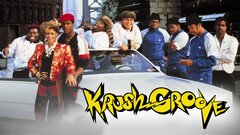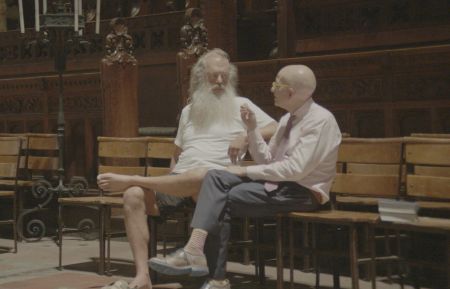Rick Rubin

Record Producer • Executive
Birth Date: March 10, 1963
Age: 61 years old
Birth Place: Lido Beach, New York
Arguably one of the music business' most successful and influential record producers for over three decades, Rick Rubin helped to popularize hip-hop music in the 1980s through the seminal Def Jam Records, which he co-founded with entrepreneur Russell Simmons. His stripped-down production style, which emphasized the artist over the beats while melding rap and rock elements made such acts as Run-DMC, the Beastie Boys and LL Cool J into mainstream superstars and minted Rubin as a visionary force in the future of popular music.
After leaving Def Jam in 1988, he launched a new label, Def American, which featured Rubin's celebrated, award-winning collaboration with rock acts like Slayer and the Red Hot Chili Peppers, as well as established artists, most notably Johnny Cash, whose career was revitalized by a series of acclaimed albums with Rubin. By the new millennium, Rubin had produced some of the biggest records of the decade by major artists like the Dixie Chicks, Justin Timberlake, Neil Diamond and Metallica, which preceded his appointment as co-head of Columbia Records.
Though the job was plagued by conflict with the label's executives, the discord did not prevent Rubin from continuing his winning streak, with two Grammys for Producer of the Year and Album of the Year with Adele's starmaking 21 (2012). Rubin's long, storied career and ability to draw the best from a wide variety of artists made him a major creative force within the increasingly moribund music industry.
Born Frederick Jay Rubin in Long Beach, NY on March 10, 1963, Rick Rubin was the only child of Jewish parents Mickey and Linda Rubin, whom he recalled in interviews as both smothering and indulgent figures throughout his childhood. He grew up in Lido Beach, NY, fascinated by both magic and pop music, with a particular affinity for the Beatles and especially the Monkees, whose stable of songwriters, including Neil Diamond, Carole King and Gerry Goffin, captured his attention. By the time Rubin had reached high school, however, he had shifted his interests towards punk and heavy metal.
The choice pushed him even further to the fringes of social standing at Long Beach High School, where he was considered an outsider. Rubin briefly flirted with performing as a member of a punk act called "The Pricks," which attempted to draw attention to themselves by orchestrating a small riot at CBGB's, which was subsequently shut down by a law officer which was, in fact, Rubin's father dressed in his Lido Beach auxiliary police uniform. Rubin soon began recording music on his high school's four-track recorder, which marked the rudimentary beginning of what would become Def Jam Records.
Rubin attended New York University with the intention of applying to law school, but devoted most of his energy to a new band, Hose, which released a 45 single recorded on a portable tape player in a NYU dorm activity room in 1982. But by the following year, Rubin's interests had moved away from the group to focus on the New York hip-hop scene, which he regarded as an African-American form of punk rock. With the help of Zulu Nation DJ Jazzy Jay, he began experimenting with hip-hop production, but eschewed the popular approach of MCs rapping over popular disco songs in favor of the spare beats he heard in clubs.
In 1984, he borrowed $5,000 from his parents to produce "It's Yours" by T La Rock and Jazzy Jay, which was the first official Def Jam Records release. The song became an immediate hit in New York clubs, where it captured the attention of a young, up-and-coming promoter named Russell Simmons, who was shocked to learn that Rubin was white. The pair soon became partners in Def Jam, which initially operated from Rubin's college dorm room. He would later play a character based loosely on himself in the cult favorite "Krush Groove" (1985), a music business drama produced and inspired by Simmons' early career.
The label's next release, 1984's "I Need a Beat," by a 16-year-old rapper named LL Cool J, sold over 100,000 copies. It preceded a flurry of groundbreaking hit records, including Run-DMC's Raising Hell (1986), which marked the beginning of Rubin's interest in merging rap with hard rock on a team-up with Aerosmith on the group's venerable single "Walk This Way." The song not only helped to usher Run-DMC into the Top 5 on the Billboard singles chart, but brought Aerosmith back to prominence after a decade or more in career doldrums.
Rubin's second rap-rock experiment yielded even greater returns: "(You Gotta) Fight For Your Right (to Party!)," by white rappers the Beastie Boys, featured blistering guitar work by Kerry King of Slayer, Def Jam's first metal act. The single helped to send the group's debut album, Licensed to Ill (1986) to the top of the Billboard albums chart, making it the first rap album to do so. The following year, Rubin served as executive producer on Yo! Bum Rush the Show (1987), the debut release by the controversy-courting, politically charged rap group Public Enemy.
All three records were instrumental in introducing hip-hop music to a wider audience than any previous effort, as well as helping to dispel the notion that the genre was a fad. Major labels soon came calling, with CBS Records winning the right to distribute Def Jam records through Columbia Records for $600,000.
However, the deal with CBS caused a rift between Rubin, who pushed for a smaller up-front payment and greater independence with future recordings, and Simmons, who sought to claim the entire fee. Rubin completed a flurry of work for the label, including the Cult's Electric (1987) album, the "Less Than Zero" (1987) soundtrack and "Tougher than Leather" (1988), a urban action film starring Run-DMC that marked his debut as writer and director, before cutting ties with Simmons.
He then moved to Los Angeles, where he launched his own label, Def America, which distributed its recordings through Geffen Records. There, he divided his attention between his two loves: hard rock groups like Slayer, Danzig and the Black Crowes, and hip-hop acts like Public Enemy and the Geto Boys. However, the latter group's self-titled album ended his relationship with Geffen over its lyrical content, which described grisly acts of violence in graphic detail. Rubin soon signed a distribution deal with Warner Bros., which oversaw some of his biggest projects of the 1990s, including the Red Hot Chili Peppers' "Blood Sugar Sex Magik" (1991), a key album of the alternative music scene of the early 1990s thanks to its confessional single "Under the Bridge," which transformed the Los Angeles group from party-hearty funk-rockers into a more serious-minded band. Hit albums by Mick Jagger, Tom Petty and the Heartbreakers, Sir Mix-a-Lot and Andrew Dice Clay also rounded out his roster during the early 1990s.
After discovering that the word "def" was now listed in dictionaries, Rubin officially changed his label's name to American Recordings at an elaborate "funeral" overseen by the Reverend Al Sharpton. He then shifted the label's focus from fostering new groups to bolstering established acts whose music was no longer attracting critical or listener interest.
His first choice for collaboration was country legend Johnny Cash, whose career had slipped into obsolescence during the 1980s and 1990s. Rubin decided to craft an album that placed Cash's semi-mythical "Man in Black" persona in a contemporary context through a song list that combined material by classic songwriters like Leonard Cohen and Kris Kristofferson with newer, more unexpected contributors like Glenn Danzig, Tom Waits and Nick Lowe. The resulting album, 1994's American Recordings, won a Grammy for Best Contemporary Folk Album, and returned Cash to the spotlight.
Cash and Rubin would collaborate on four more albums before the singer's death in 2003, including 2002's American IV: The Man Comes Around, which featured his Grammy-winning take on Nine Inch Nails' "Hurt." Enough additional material was recorded by Cash and Rubin during this period to release six posthumous albums, including a four-disc boxed set, Unearthed, in 2004. While completing his decade-long work with Cash, Rubin also released albums by such classic artists as Tom Petty, AC/DC, Donovan, and Lucinda Williams while balancing work by newer artists like the Chili Peppers, System of a Down and Sheryl Crow.
Rubin's efforts in the new millennium continued along a similar path, working with established artists like Aerosmith, Joe Strummer and Neil Diamond, whose 12 Songs (2005) was undermined by Sony Records' decision to release it with spyware that prevented the album from being copied. At the same time, he continued to branch out both in terms of new artists like Lil Jon and the all-star Audioslave and performers whose work stood afield from Rubin's typical efforts, like Latin superstar Shakira, on whose multi-Grammy-winning albums Fijación Oral Vol. 1 (2005) and Oral Fixation Vol. 2 (2005) he served as executive producer.
In 2006, Rubin contributed to three of the five Grammy nominees for Album of the Year - the Red Hot Chili Peppers' Stadium Arcadium, FutureSex/LoveSounds (2006) by Justin Timberlake, and the Dixie Chicks' Taking the Long Way (2006) - and took home the Producer of the Year Grammy for his work on albums by U2, Green Day and Johnny Cash. The slew of accolades helped to pave the way for his appointment as co-head of Columbia Records the following year.
The new position, however, proved an uncomfortable fit for the veteran producer, whose decidedly non-corporate work ethic and persona clashed with the established executive body at the label. Media pundits, too, pointed to Rubin's decided lack of chart success at the label, with only four No. 1 albums, including Neil Diamond's Home Before Dark (2008) and Metallica's Death Magnetic (2008) during his tenure and no gold or platinum albums, as well as clashes with artists like Crosby, Stills and Nash, Velvet Revolver and Slipknot over his production style.
Despite these setbacks, Rubin continued to mine Grammy gold with his efforts, including a second Producer of the Year Grammy in 2009 for work with Diamond, Metallica, Weezer and Jakob Dylan, and the Album of the Year for Adele's 21 (2012).
By Paul Gaita
Credits

Thank You Very Much

Behind the MusicStream

McCartney 3, 2, 1Stream

McCartney 3, 2, 1Stream

McCartney 3, 2, 1Stream

Biography: The Nine Lives of Ozzy Osbourne

Shangri-LaStream

Shangri-LaStream

My Next Guest Needs No Introduction With David LettermanStream

I Am Johnny Cash

Johnny Cash: American Rebel Exclusive First Look

One Track Heart: The Story of Krishna Das

Desert Island Discs

Behind the Music

Tougher Than Leather

The Pick-Up Artist

Krush GrooveStream

Saturday Night LiveStream

60 MinutesStream








